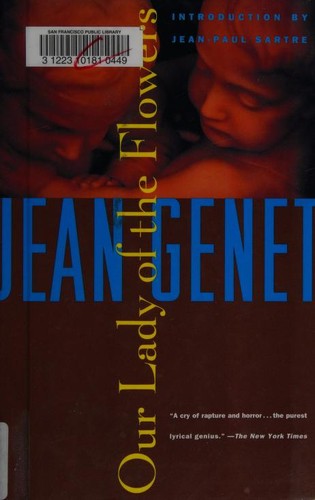Brossura, 307 pagine
lingua English
Pubblicato il 18 Novembre 1991 da Grove Press.

Brossura, 307 pagine
lingua English
Pubblicato il 18 Novembre 1991 da Grove Press.
Our Lady of the Flowers (Notre-Dame-des-Fleurs) is the debut novel of French writer Jean Genet, first published in 1943. The free-flowing, poetic novel is a largely autobiographical account of a man's journey through the Parisian underworld. The characters are drawn after their real-life counterparts, who are mostly homosexuals living on the fringes of society.
The novel tells the story of Divine, a drag queen who, when the novel opens, has died of tuberculosis and been canonised as a result. The narrator tells us that the stories he is telling are mainly to amuse himself whilst he passes his sentence in prison – and the highly erotic, often explicitly sexual, stories are spun to assist his masturbation. Jean-Paul Sartre called it "the epic of masturbation".
Divine lives in an attic room overlooking Montmartre cemetery, which she shares with various lovers, the most important of whom is a pimp called Darling Daintyfoot. …
Our Lady of the Flowers (Notre-Dame-des-Fleurs) is the debut novel of French writer Jean Genet, first published in 1943. The free-flowing, poetic novel is a largely autobiographical account of a man's journey through the Parisian underworld. The characters are drawn after their real-life counterparts, who are mostly homosexuals living on the fringes of society.
The novel tells the story of Divine, a drag queen who, when the novel opens, has died of tuberculosis and been canonised as a result. The narrator tells us that the stories he is telling are mainly to amuse himself whilst he passes his sentence in prison – and the highly erotic, often explicitly sexual, stories are spun to assist his masturbation. Jean-Paul Sartre called it "the epic of masturbation".
Divine lives in an attic room overlooking Montmartre cemetery, which she shares with various lovers, the most important of whom is a pimp called Darling Daintyfoot. One day Darling brings home a young hoodlum and murderer, dubbed Our Lady of the Flowers. Our Lady is eventually arrested and tried, and executed. Death and ecstasy accompany the acts of every character, as Genet performs a transvaluation of all values, making betrayal the highest moral value, murder an act of virtue and sexual appeal.